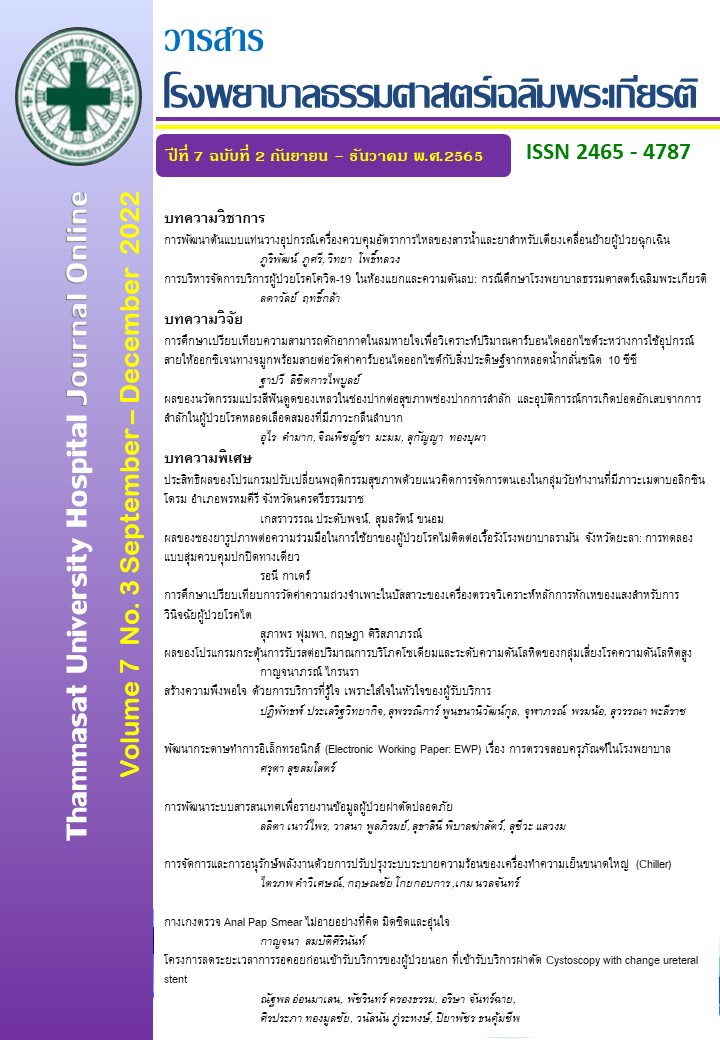The Effects of Health Behavior Modification Program with Self-management Concepts in Adults with Metabolic Syndrome in Phromkhiri district, Nakhon Si Thammarat province
Keywords:
Health behavior modification program, self-management, Adults, Metabolic syndromeAbstract
Background: Metabolic Syndrome is a major risk factor for cardiovascular disease. These diseases are now the first cause of death in the population.
Objective This quasi-experimental research was designed was to evaluate the effects of health behavior modification program with self-management concepts in adults with metabolic syndrome in Phromkhiri district, Nakhon Si Thammarat province.
Material and methods: The sample included 76 adults individuals with metabolic syndrome. The participants were divided in to an experimental group (n=38) and a control group (n=38). The experimental group received a program of health behavior modification program with self-management concepts in adults with metabolic syndrome while the control group received regular attention but with no interventions. Results were evaluated in week 16 with the data analysis using descriptive statistics, the chi-square test and t-test.
Result: The results showed that after the 16th week of the experiment, the experimental group had a significant reduction in blood glucose, blood pressure and waist circumference statistically significant lower than before the experiment (p<.05). Comparing the experimental group and the control group, the mean blood glucose level and blood pressure of the experimental group was significantly lower than the control group (p<.05) at week 16; however, the mean waist circumference was not significantly different (p>0.05).
Conclusion: The results of the research can be used as a guideline for reviewing and designing exercise education programs, food consumption and appropriate stress management in adults with metabolic syndrome as well as expanding the study results to other community areas. This is part of the mechanism that helps reduce the burden of medical expenses of the government, reduce the chances of disability and death of the people.
References
Zainuddin AA, Manickam MA, Baharudin A, Selamat R, Cheong KC, Ahmad NA. Prevalence and socio-demographic determinant of overweight and obesity among Malaysian adult. Inter J of Pub Health. 2016;6(1):661-669.
Singh AK & Kari JA. Metabolic syndrome and chronic kidney disease. Curr Opin Nephrol Hypertens. 2013;22(2):198-203.
สำนักโรคไม่ติดต่อ กรมควบคุมโรคกระทรวงสาธารณสุข. รายงานประจำปี 2563. โรงพิมพ์องค์การสงเคราะห์ทหารผ่านศึกในพระบรมราชูปถัมภ์.กรุงเทพฯ. 2564.
นิยะนันท์ สำเภาเงิน และ ดวงกมล ชาติประเสริฐ. อิทธิพลของการรับรู้ความเสี่ยงต่อพฤติกรรมสุขภาพและแนวทางการสื่อสาเพื่อสร้างพฤติกรรมการป้องกันโรคไม่ติดต่อเรื้อรังของกลุ่มเสี่ยง. วารสารการประชา สัมพันธ์และการโฆษณา. 2557;7(2):38-58.
ชัยวัน เจริญโชคทวีและคณะ. ภาวะเมแทโบลิกซินโดรม และความเสี่ยงต่อโรคหัวใจและหลอดเลือดของบุคลากรคณะแพทยศาสตร์ วชิรพยาบาล. วชิรเวชสาร. 2555;56(3): 183-191.
วราพรรณ วงษ์จันทร์. ภาวะเมตาบอลิกซินโดรมวัยผู้ใหญ่: การจัดการตนเอง. วารสารพยาบาลทหารบก. 2561;19(พิเศษ):16-24.
ชดช้อย วัฒนะ. การสนับสนุนการจัดการตนเอง: กลยุทธ์ในการส่งเสริมการควบคุมโรค. วารสารวิทยาลัยพยาบาล พระปกเกล้าจันทบุรี.2558;26(ฉบับเพิ่มเติม 1):117-127.
สุนิสา สีผม. การจัดการตนเองในผู้ป่วยโรคไตเรื้อรัง.วารสารพยาบาลสภากาชาดไทย. 2556;6(1):12-17.
ปราโมทย์ ถ่างกระโทก. บทบาทพยาบาลวิชาชีพในการจัดการโรคเรื้อรัง. วารสารพยาบาลสงขลานครินทร์. 2560;37(2): 154-159.
Hopp, L & Walker, J. Effectiveness of arm exercise on dyspnea in patients with chronic obstructive pulmonary disease: a systematic review. JBI Library of Systematic Reviews.2009;7(3):1352-1371.
Cao, Z. J., Wang, S. M., & Chen, Y. A Randomized trial of multiple interventions for childhood obesity in China. Am. J. Prev. Med. 2015;48(5): 552-560.
จุฑามาส จันทร์ฉาย, มณีรัตน์ ธีระวิวัฒน์ และนิรัตน์ อิมามี. โปรแกรมการเรียนรู้เรื่องเบาหวานและการจัด การตนเองของผู้ที่เป็นโรคเบาหวานชนิดที่ 2 จังหวัดประจวบคีรีขันธ์. สาธารณสุขมหาวิทยาลัย
อารีย์ เสนีย์. โปรแกรมการจัดการตนเองในผู้ป่วยโรคเรื้อรัง. วารสารพยาบาลทหารบก. 2557;15(1): 129-134.
จุฑามาศ เกษศิลป์, พาณี วิรัชชกุล และ อรุณี หล่อนิล. การจัดการดูแลตนเอง ความรู้คุณภาพชีวิตของผู้ป่วยเบาหวานชนิดที่ 2 รายใหม่ก่อน-หลัง เข้าโปรแกรมจัดการการดูแลตนเองในผู้ป่วยเบาหวานชนิดที่ 2 ในเขต อ.เมือง จ.อุทัยธานี. วารสารกองการพยาบาล 2556;40 (1):84-102.
จินตนา บัวทองจันทร์, อุบล สุทธิเนียม, และ เสมอจันทร์ ธีระวัฒน์สกุล. ผลของโปรแกรมการจัดการตนเองต่อพฤติกรรมสุขภาพในบุคคลกลุ่มเสี่ยงที่มีการเผาผลาญอาหารผิดปกติ. วารสารวิทยาลัยพยาบาลบรมราชชนนี นครราชสีมา. 2556;19(2):46-59.
สมใจ จางวาง, เทพกร พิทยภินัน และนิรชร ชูติพัฒนะ. ปัจจัยที่มีความสัมพันธ์กับพฤติกรรมการดูแลตนเองเพื่อป้องกันโรคเบาหวานและความดันโลหิตสูงของประชาชนกลุ่มเสี่ยง.วารสารวิทยาลัยการพยาบาลและการสาธารณสุขภาคใต้. 2559;3(1):110–128.
Downloads
Published
How to Cite
Issue
Section
License
Copyright (c) 2022 Thammasat University Hospital Journal Online

This work is licensed under a Creative Commons Attribution-NonCommercial-NoDerivatives 4.0 International License.



